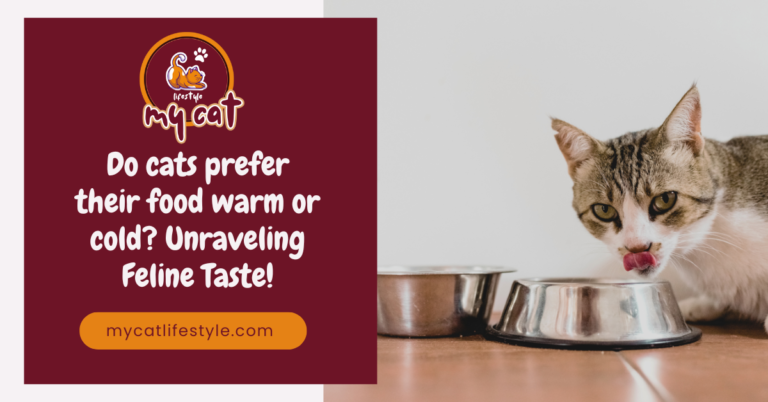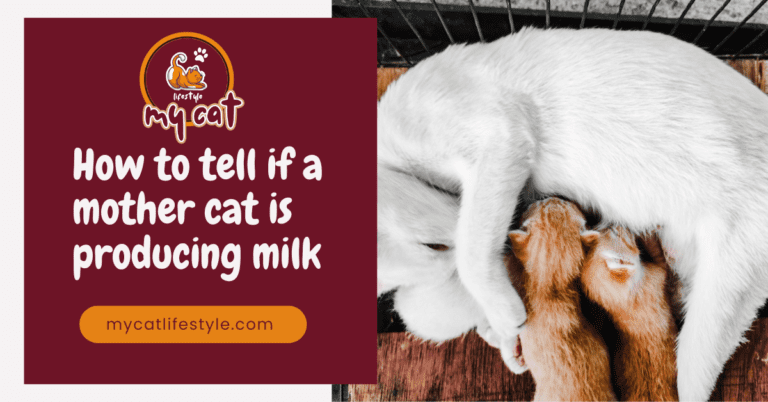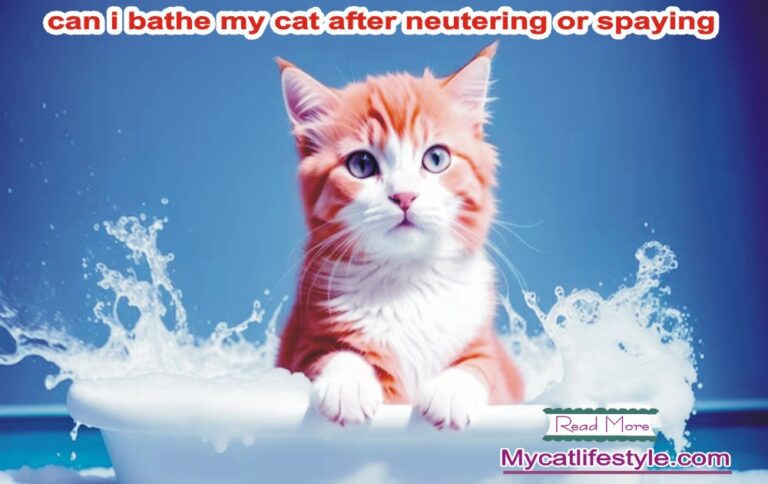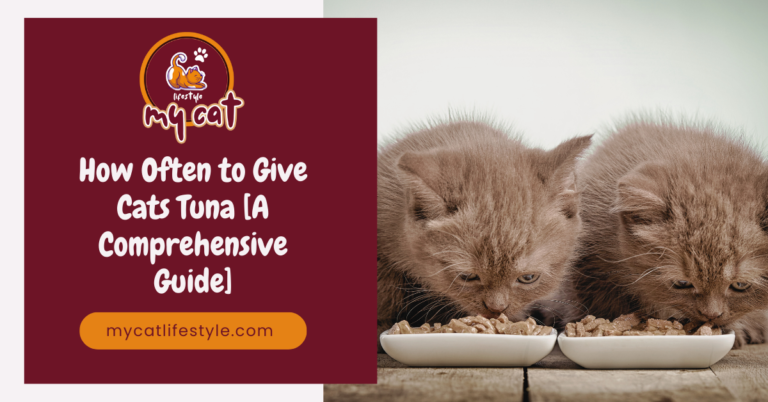Why Is My Cat Vomiting At Night?
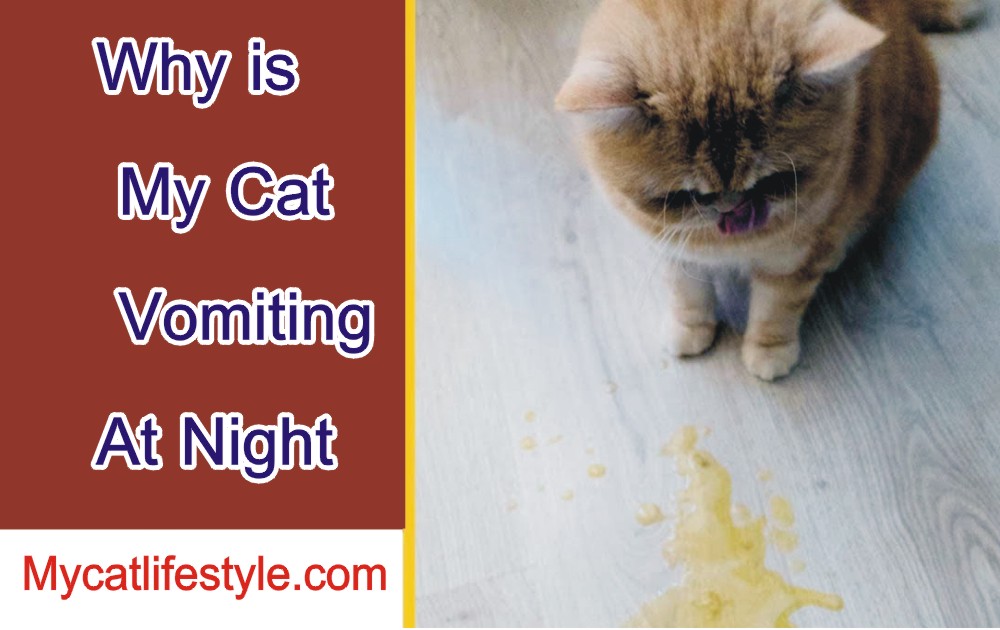
Discovering that your cat has been vomiting at night can be worrying and puzzling. Night time vomiting in cats can be caused by various issues, ranging from dietary indiscretions to more severe health concerns. Understanding why your furry friend is experiencing these nocturnal discomforts is crucial for providing the appropriate care and ensuring their well-being. This guide explores the common reasons behind nighttime vomiting in cats, offering insights into when you should be concerned and how you can help your cat.
Cats are creatures of habit, and any deviation from their normal behavior, such as vomiting at night, warrants attention. It could be something as simple as eating too quickly or as complex as an underlying health condition.
By delving into the possible causes, symptoms to watch for, and when to seek veterinary care, this article will equip you with the knowledge needed to better care for your cat. Stay tuned as we explore how to ensure your cat’s night times are as peaceful and comfortable as their daytime lounging.

Why Is My Cat Vomiting At Night?
Nighttime vomiting in cats can be a perplexing issue for many pet owners. This phenomenon may occur for various reasons, from relatively benign to more serious health concerns. Understanding the root causes can help address the issue effectively and ensure your cat’s health and comfort.
Firstly, consider the timing of your cat’s meals. Cats fed once a day, in the evening, might eat too quickly or too much, leading to discomfort and vomiting during the night. Their digestive systems are designed for smaller, more frequent meals, so this feeding strategy can sometimes backfire.Another factor to consider is the type of food being offered. Some cats may develop sensitivities or allergies to certain ingredients in their food, leading to gastrointestinal upset manifesting as nighttime vomiting. It’s also possible that if your cat is an outdoor explorer or has access to plants indoors, they might ingest something toxic or indigestible during the day, with the effects becoming evident at night.
Stress and anxiety can also lead to nighttime vomiting. Cats are creatures of habit and sensitive to changes in their environment. Any disruption in their routine, such as a new pet, a recent move, or even changes in the household dynamics, can cause stress that manifests physically.Lastly, medical reasons should not be overlooked. Conditions like inflammatory bowel disease, hyperthyroidism, or even kidney disease can lead to symptoms that worsen at night when the cat is resting and its body is in a different state of activity compared to the day.Recognizing the pattern and frequency of vomiting is crucial in determining its cause. Occasional vomiting may not be a cause for immediate concern, but if your cat regularly vomits at night, a visit to the vet is warranted to rule out any underlying health issues.
What To Do About My Cat Vomiting At Night?
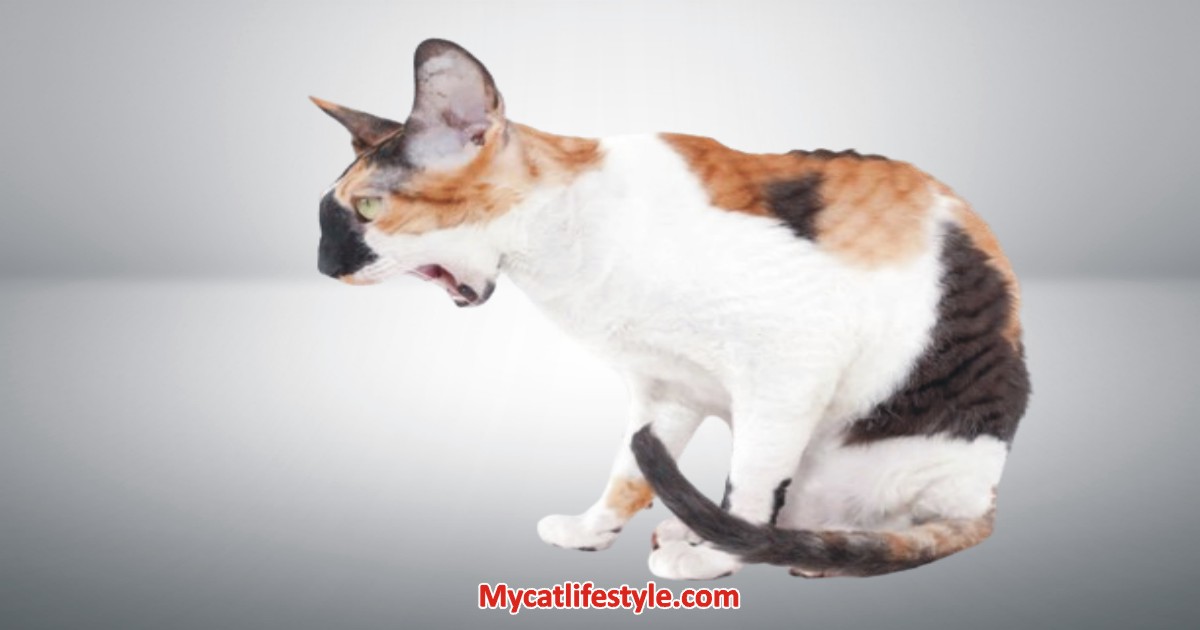
When your cat starts vomiting at night, it’s natural to feel concerned. The good news is there are several steps you can take to help alleviate this issue. Addressing nighttime vomiting involves observing your cat’s behavior, making dietary adjustments, and, if necessary, seeking veterinary care.
- Observe and Document:
Start by keeping a diary of your cat’s vomiting episodes. Note the time, frequency, and any potential triggers, such as recent changes in diet or environment. This information can be invaluable for your vet if a visit becomes necessary.
- Dietary Adjustments:
Review your cat’s feeding schedule. Feeding your cat smaller, more frequent meals can help manage hunger and reduce the likelihood of eating too quickly and vomiting. Consider using a slow feeder bowl if your cat eats too fast. Additionally, evaluate the type of food you’re providing. Cats with sensitive stomachs may benefit from a diet formulated for digestive health. Explore options for high-quality, easily digestible cat food, and consider introducing new foods gradually to avoid upsetting your cat’s stomach.
- Environmental Enrichment:
Stress can be a significant factor in nighttime vomiting. Enhance your cat’s environment with toys, climbing structures, and opportunities for play to reduce stress and anxiety. A calm and enriched environment can positively impact your cat’s digestive health.
- Avoid Toxins:
Ensure your cat does not have access to toxic plants or substances. Regularly check the ASPCA’s list of toxic and non-toxic plants (ASPCA Toxic and Non-Toxic Plants List) and remove any dangerous items from your home.
- Seek Veterinary Care:
If the vomiting persists despite your best efforts, it’s crucial to consult with a veterinarian. Persistent vomiting can lead to dehydration and other serious health issues. Your vet may recommend diagnostic tests to rule out medical conditions such as gastrointestinal blockages, kidney disease, or hyperthyroidism. Always follow your vet’s advice and treatment plans.
Remember, your cat’s health and well-being are paramount. Prompt action and attention to dietary and environmental factors can make a a significant difference in managing nighttime vomiting. For more in-depth guidance, consider consulting reputable sources such as VeterinaryPartner.com for further reading on cat health and wellness.
What Could Be the Reason for the Vomiting?
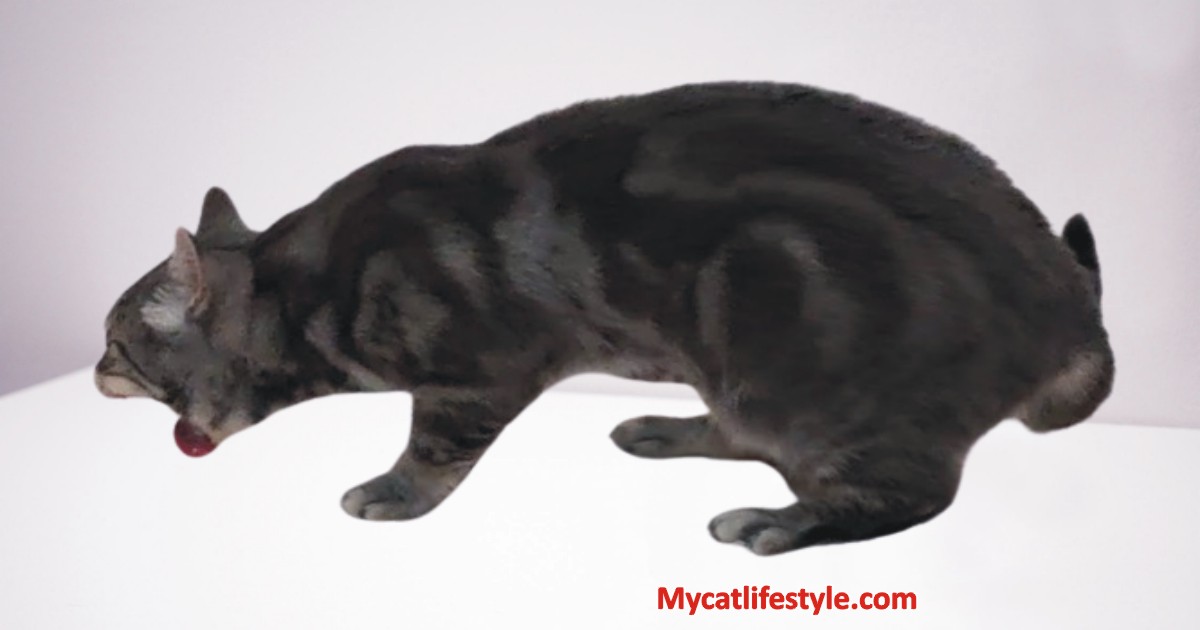
Understanding the reasons behind your cat’s vomiting is the first step toward providing them with the appropriate care. The causes can range from simple, easily remedied issues to serious health concerns requiring veterinary attention.
- Furballs
- Eating Too Rapidly
- Overeating at Once
- Eating Spoilt Food or Hunting
More Serious Causes for Vomiting:
- Ingestion of Foreign Bodies
- Ingestion of Certain Toxins
- Food Allergies or New Foods
- Parasites – Roundworms, Tapeworms, and Fleas
Identifying the cause of vomiting in your cat involves observing their behavior, diet, and environment for potential triggers. While some causes are less worrying and can be addressed with simple changes at home, others necessitate professional medical attention. Suppose your cat’s vomiting is frequent, accompanied by other symptoms, or you suspect they’ve ingested something harmful. In that case, it’s crucial to consult with your veterinarian for a thorough evaluation and appropriate treatment.
Know Some Basics to Help Relieve Your Cat’s Night Vomiting
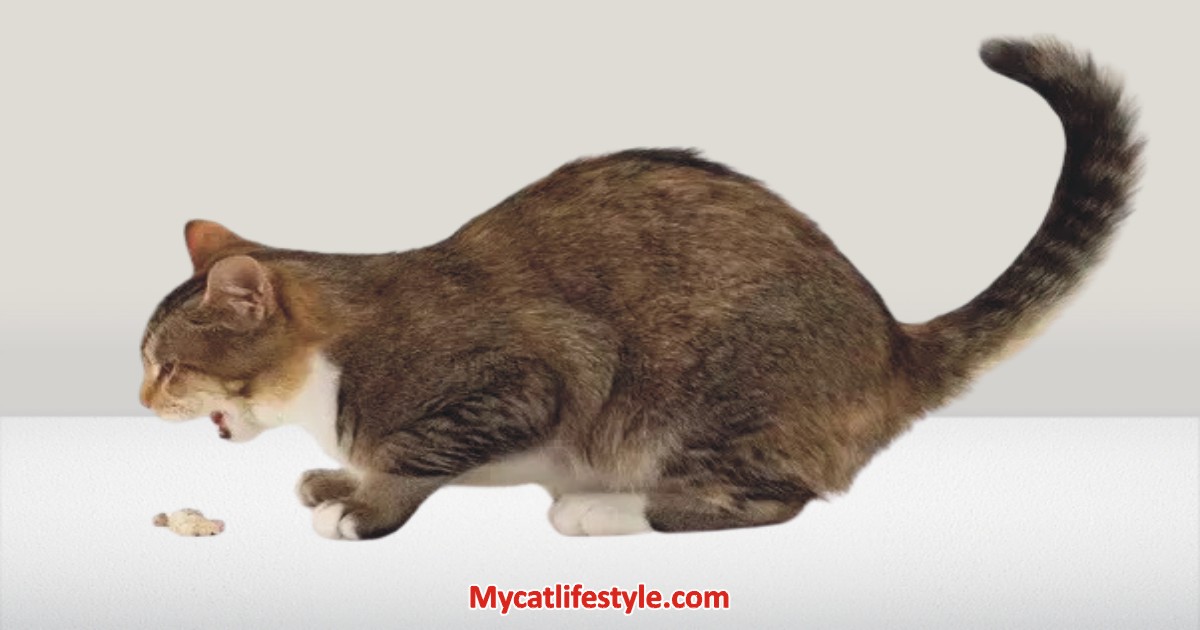
Alleviating your cat’s nighttime vomiting starts with understanding and implementing basic care strategies. These foundational steps not only help provide immediate relief but also contribute to the long-term well-being of your feline friend.
- Hydration
Ensure your cat has constant access to fresh, clean water. Dehydration can be a concern with frequent vomiting, and adequate hydration can aid digestion and help flush out toxins. Consider adding a cat water fountain to encourage your cat to drink more water, as the water movement can be more enticing than a stagnant bowl.
- Gradual Dietary Changes
If you suspect your cat’s diet is the cause, consider transitioning to a more digestible food option. However, any dietary change should be gradual to avoid further upsetting your cat’s stomach. Mix the new food with the old, gradually increasing the proportion over a week to help your cat adjust.
- Create a Stress-Free Environment:
Cats are susceptible to their environment. Maintain a routine to minimize stress and anxiety. This includes regular feeding times, quiet sleeping areas, and familiar play activities. Pheromone diffusers or sprays can also help create a calming environment for your cat.
- Engage in Play:
Regular playtime is not just good for your cat’s physical health but also its mental well-being. Playing before bedtime can help tire your cat out and reduce stress-induced vomiting incidents at night.
- Monitor for Hairballs:
Regular grooming can help reduce hairballs, which may cause vomiting. If your cat is prone to hairballs, consider a hairball remedy or a diet formulated to help reduce hairballs.
- Routine Veterinary Check-ups:
Regular check-ups with your veterinarian can help catch and address any underlying health issues before they become serious. If your cat’s vomiting persists, detailed diagnostics, including bloodwork, ultrasounds, or x-rays, may be necessary to identify the cause.
Implementing these basic care strategies can significantly improve your cat’s quality of life and potentially reduce or eliminate nighttime vomiting episodes. Remember, each cat is unique, and what works for one may not work for another. Observing your cat’s response to these changes and adjusting as necessary is vital to finding the best solution for your pet.
Vomiting in Cats When to Worry

While occasional vomiting in cats isn’t uncommon and can result from benign causes like hairballs or minor dietary indiscretions, there are sure signs that indicate it’s time to take your cat’s vomiting more seriously. Recognizing these signs are crucial for ensuring your cat receives The necessary care and attention to address any underlying health issues.
- Frequent or Chronic Vomiting:
If your cat vomits multiple times a month or seems to be vomiting more frequently over time, it’s a sign that something more serious could be at play. Chronic vomiting can lead to dehydration, electrolyte imbalances, and nutritional deficiencies.
- Vomiting Accompanied by Other Symptoms:
Be alert to symptoms that accompany vomiting, such as lethargy, diarrhea, loss of appetite, or weight loss. These signs indicate various conditions, from infections to systemic diseases like kidney failure or diabetes.
- Vomiting of Blood:
The presence of blood in vomit, whether bright red or looking like coffee grounds (digested blood), warrants immediate veterinary attention. This could indicate a severe gastrointestinal issue, such as ulcers or internal bleeding.
- Unproductive Vomiting Attempts:
If your cat appears to be trying to vomit but nothing comes up, this could be a sign of a blockage or another serious condition. Unproductive vomiting attempts, especially if your cat shows signs of distress or discomfort, require urgent veterinary evaluation.
- Dehydration:
Persistent vomiting can lead to dehydration. Signs of dehydration include lethargy, dry gums, and decreased skin elasticity. You can check for dehydration by gently pinching the skin on the back of your cat’s neck. Your cat may be dehydrated if the skin doesn’t promptly return to its normal position.
- Change in Behavior:
Changes in your cat’s behavior, such as hiding more than usual, being less active, or showing signs of aggression when touched, can indicate discomfort or pain associated with their condition.
If you observe any of these worrying signs, it’s essential to contact your veterinarian immediately. They can perform a thorough examination and recommend diagnostic tests, such as blood tests, urinalysis, or imaging studies, to determine the cause of the vomiting. Prompt and appropriate treatment can significantly affect your cat’s health and well-being. Remember, it’s always better to err on the side of caution and have your vet evaluate any concerning changes in your cat’s health.
How Can I Tell If My Cat’s Vomiting Is Caused By Food?
To determine if your cat’s vomiting is caused by food, consider the following signs and steps based on the search results:
- Frequency of Vomiting
- Lack of Appetite, Weight Loss, Lethargy, or Diarrhea
- Food Allergies or Sensitivities
- Regurgitation vs. Vomiting
- Observing Vomit Characteristics
- Consulting a Veterinarian
By monitoring your cat’s vomiting frequency, observing associated symptoms, considering potential food allergies or sensitivities, understanding regurgitation versus vomiting, and noting vomit characteristics, you can better assess if food is the cause of your cat’s vomiting and seek appropriate veterinary care if needed.
How to Prevent Vomiting
You can also take action to help prevent or decrease the frequency of vomiting in your cat:
- Slow Down Their Eating
- Use a Trick to Slow Eating
- Change Their Diet for Allergies
- Regular Vet Visits
- Keep Dangerous Items Away
- Manage Hairballs
These tips are meant to guide you in keeping your cat happy and Healthy. Always consult with your veterinarian for advice tailored to your cat’s specific needs.
How Will My Veterinarian Decide What Type Of Testing And Treatment Is Necessary?
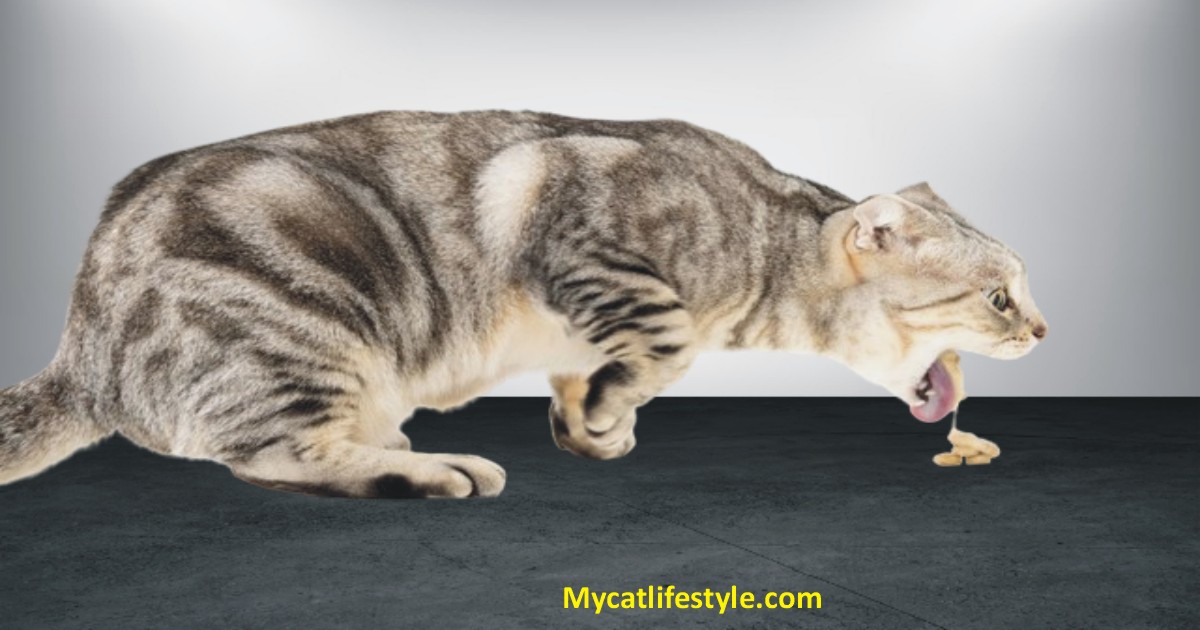
Your vet will examine different factors to determine the best way to help your cat. Here’s what you can notice and tell your vet that can help:
- Mood and Energy
- Eating Habits
- Weight Changes
- Blood in Vomit
- Pain or Discomfort
- Bathroom Habits
- Vomiting Details
- Vomit Appearance
- Diet
- Access to Other Foods or Substances
- Recent Treatments or Supplements
- Other Cats
If any other cats living with you show similar symptoms. Sharing these details with your vet helps them decide if your cat needs simple treatment or more tests to determine what’s wrong. Always watch these signs and communicate with your vet for the best care for your cat.
What other treatment or diagnostic testing may be required?
- For Severe Cases:
If your cat is vomiting a lot, they might need to stay at the vet’s office to get fluids through an IV to help with dehydration and fix any electrolyte issues. Sometimes, they might also need shots to stop the vomiting.
- Home Care:
In milder situations, you might be able to care for your cat at home. This can include giving them fluids and unique treatments under the vet’s guidance, doing it slowly and in small amounts.
- Extra Tests for Ongoing Vomiting:
If your cat keeps vomiting for over a few weeks, even if they seem OK otherwise, your vet will want to figure out why. Here are some tests they might do:
- Blood Tests:
To check for infections, kidney or liver issues, thyroid problems, diabetes, and other conditions.
- X-rays:
To look for problems in the esophagus or stomach. Sometimes, they use barium to better see blockages, tumors, ulcers, or foreign objects.
- Ultrasound:
This helps see the stomach and intestines from the inside and can spot blockages, tumors, or inflammation.
- Endoscopy:
A tiny camera on a flexible tube that looks inside the stomach. It can also collect small samples of tissue for testing. This requires the cat to be asleep under anesthesia.
- Laparotomy (Exploratory Surgery):
Sometimes, surgery is needed to find or fix the problem, especially if there’s a suspected blockage. The vet can examine all the abdominal organs and take tissue samples during this procedure.
After Finding the Cause:
Once the vet knows what’s causing the vomiting, treatment might include exceptional food, medicine, or sometimes surgery.It’s important to closely follow your vet’s advice and let them know if your cat’s condition changes or if the home treatment seems to distress your cat.
Frequently Asking Questions
How can I help my cat with vomiting?
To help your cat with vomiting, first identify any potential causes, such as dietary issues or stress. Ensure they have access to fresh water, consider feeding smaller, more frequent meals, and gradually introduce new foods. If vomiting persists, consult a veterinarian for a thorough examination.
Why does my cat vomit at night only?
Cats may vomit at night due to various reasons, including eating too quickly, consuming a large meal in the evening, stress, or underlying health issues. Monitoring their behavior and meal patterns can provide insights into the cause.
Why is my kitty cat throwing up?
Vomiting can result from many factors, including hairballs, dietary indiscretion, eating too fast, food allergies, or more severe conditions like parasites or ingestion of foreign objects. Identifying the cause is crucial for appropriate treatment.
How do you clean up cat vomit?
First, remove as much of the solid matter as possible to clean up cat vomit. Then, use water and mild detergent to clean the area. For carpets, an enzymatic cleaner can help eliminate odors and stains. Always wear gloves to protect yourself from potential contaminants.
My cat keeps throwing up but seems OK.
Frequent vomiting can indicate underlying health issues even if your cat appears fine. Monitoring their behavior and dietary habits is essential. A vet visit is necessary to rule out severe conditions if vomiting continues.
Cat Vomit Color Chart?
- Clear or white:Often related to hairballs or empty stomachs.
- Yellow:Could indicate bile, usually seen when the cat vomits on an empty stomach.
- Brown or food-colored:Typically, this is undigested food.
- Red (blood) or dark coffee grounds appearance:Indicates potential internal bleeding and requires immediate veterinary attention.
Vomiting in Cats When to Worry?
Worry if vomiting is frequent, accompanied by other symptoms like lethargy or diarrhea, contains blood, or if your cat is unproductive in vomiting attempts. These signs warrant a prompt veterinary evaluation.
Home Remedies for Cat Vomiting?
While some home remedies can offer temporary relief, treating the root cause of vomiting is essential. A bland diet (like boiled chicken and rice) for a day or two can help settle your cat’s stomach. However, always consult a veterinarian before trying home remedies, especially if vomiting persists.
Conclusion
Dealing with a cat’s nighttime vomiting can be concerning for any pet owner. However, understanding the potential causes and knowing when to seek veterinary advice is critical to managing and alleviating this issue. From dietary adjustments to environmental enrichment and recognizing the signs of more severe health concerns, there are several steps you can take to help your furry friend feel better. Remember, each cat is unique, and what works for one may not work for another. Therefore, observing your cat’s behavior, monitoring their health, and maintaining regular veterinary check-ups are essential in ensuring their well-being. In cases of frequent or severe vomiting, prompt veterinary intervention is crucial to address underlying conditions and prevent further health complications. By staying informed, attentive, and proactive in your cat’s care, you can help ensure they lead a healthy, happy life. Always prioritize your cat’s comfort and safety, and don’t hesitate to seek professional advice when needed. With the proper care and attention, you can navigate the challenges of nighttime vomiting and provide your cat with the loving support they need.

